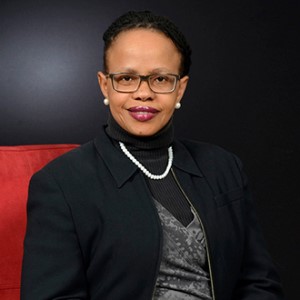College of Economic & Management Sciences
Professor Makhitha has a passion for emerging market online shoppers

Professor Merci Makhitha
The market size of online shopping in South Africa is currently at R30,2 billion – an increase of 66% from R14,1 billion in 2018, said Professor Merci Makhitha during her inaugural lecture on 3 February. The topic of her lecture was The consumer behaviour of emerging market consumers in an online shopping environment.
Makhitha indicated that this topic was important to her because the emerging online market consumers in SA represent a lucrative market with unique needs, behaviours, expectations, and lifestyles. Therefore, their behaviours as consumers should be investigated to help businesses target them appropriately.
Sharing some of her insights into the growing online shopping market, she said online shopping penetration in South Africa is expected to rise to 60% during 2022.
She observed that the consumption patterns of the emerging black middle class diverge substantially from the other groups as they want to reduce a historical asset deficit.
eCommerce has great potential in Africa and local as well as international retailers are targeting Africa’s emerging middle class. While it currently constitutes only 2% of the global ecommerce market, it is growing by 12 per cent annually and is expected to reach about 500 million online shoppers by 2025. This group demands convenience and price quality. A study on ecommerce in townships found that 28 per cent of township residents buy online. Clothing and electronics are the most popular, she argued.
According to Makhitha, Nigeria, Kenya, and South Africa account for almost half of ecommerce in Africa.
Talking about her own career, Makhitha said she believes perseverance, hard work and having a vision for one’s career are the keys to success. It wasn’t always easy, she confessed. She had to study during the day, including Saturdays and Sundays, so that she could attend to her family in the evenings.
Her interest in the consumer behaviour of the emerging market began when she started to investigate what the influences were on people’s buying patterns. During her honours studies, she realised that she had a keen interest in the subject Consumer Behaviour and later also lectured in the subject.
She said that she enjoys supervising master’s and doctoral students. “It is a good feeling when students hand their thesis or dissertation in for examination and it comes back with a pass,” she said. So far, she has guided five master’s and doctoral students to graduation.
Assisting SMMEs who struggle with marketing is another passion. She does research about them and their businesses to help them with solutions to the challenges they face.
“I am also involved in the departmental project where we do marketing consulting for SMMEs as a departmental project”, she said. “We assist SMMEs with marketing of their businesses and products – we do marketing consulting for SMMEs as a departmental project. What we learn from our research don’t only help the SMMEs with the challenges they face, we also incorporate the insights and case studies into the module content that we teach our students.”
While it never occurred to her that she would one day be a professor herself, she said, she always wanted to be like the professors who taught her at varsity. “Some of them were good teachers and I wanted to be like them.”
If there is one thing that Makhitha wishes that higher education would do, it is to introduce more work-integrated learning. Although it can be difficult to place students, considering Unisa’s large student numbers, it gives students an opportunity to gain exposure to the work before they graduate. This would give them an advantage by the time they graduate as they would have acquired some work experience.
Now that she is a full professor, Makhitha wants to focus on expanding her international research network. She currently organises an annual marketing forum for African marketing academics and has collaborated with international researchers on a book chapter. She is also looking forward to research collaboration with academics from the University of Kigali and the Romanian American University – this was agreed to in 2021.
“My main goal is to expand my international collaborations to be a visiting professor and to co-publish with my international peers”, she confessed. “Furthermore, I want to assist the black young women that I mentored, to publish and to become professors and fulfil leadership roles.”
* By Ilze Crous, Communication and Marketing Specialist, College of Economic and Management Sciences
Publish date: 2022/02/14

 Unisa co-hosts G20 community outreach in the Eastern Cape
Unisa co-hosts G20 community outreach in the Eastern Cape
 Unisans gain membership of prestigious science academies
Unisans gain membership of prestigious science academies
 Advocating for disability transformation through servant leadership
Advocating for disability transformation through servant leadership
 Unisa Press continues to illuminate the publishing space
Unisa Press continues to illuminate the publishing space